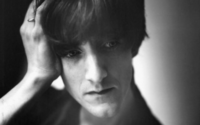Gétatchèw Mèkurya’s Entrancing Sax
I’ve written before about attending a concert to hear one particular musician only to discover another. Recently, I experienced a distinctive version of that. In April, fresh off a breakup and reeling from my partner’s sharp and sudden absence, I drove over to Wilmington to see Bon Iver play at the Live Oak Bank Pavilion. There, I came across the Ethiopian saxophonist Gétatchèw Mèkurya. Not live, of course. Mèkurya passed away in 2016, but I heard his stunning tenor saxophone, which roared over the PA in a series of sustained breaths and muscular vibratos. It was a clarion call like no other.

The music became all the more memorable thanks to the setting. Isn’t that so often the case? After the opener Dijon played a true stunner of a set, Bon Iver’s crew began setting up for the main act and that’s when Mèkurya‘s track “Shellela” burst forth over the sound system. As the crew worked swiftly and the crowd ran to grab another beer before the venue lights dimmed, I watched while the fog machines created a mystical aura about the stage. The wind coming off the Cape Fear River caught the smoke, twisting and twirling it like so many tattered ribbons. Mèkurya’s saxophone soundtracked it all so beautifully.
“Shellela” is a traditional African vocal number warriors would often sing as they prepared for battle. Mèkurya was among the first musicians to play the song with an instrument, yet he retained its sinewy delivery, its teeming bravado. It sounds like warpaint. The song begins with a jazzy inflection—electric keyboard and drums create a pacing rhythm—before Mèkurya comes tearing in, equal parts intimidation and improvisation. It is a winding spell of a song, and I sat there at Live Oak entranced.
It almost reminds me of Rahsaan Roland Kirk’s stunning tenor saxophone arrangement near the beginning of “The Inflated Tear.” The sentiments are quite different, of course. Kirk plays a dirge-like cry, but behind that steely mournfulness, that searching hurt, lies a remarkable power. It’s a strength replicated in Mèkurya’s playing, which is all the more extraordinary considering he developed his style outside of any US influence.
Once I got on the road back home the next day, I lost myself to Mèkurya’s early 1970s album Negus of Ethiopian Sax, re-released through the fantastic Ethiopiques series. (Remember, Emahoy Tsegué-Maryam Guèbrou?) It’s a gorgeous work in its entirety, but “Shellela” will forever stand out in my mind. I needed to hear it that night. Heartbreak can shatter you, leaving behind a mere shell. Without appropriating the culture behind that warrior chant, it was nice to be reminded of courage—how it pangs across time.




